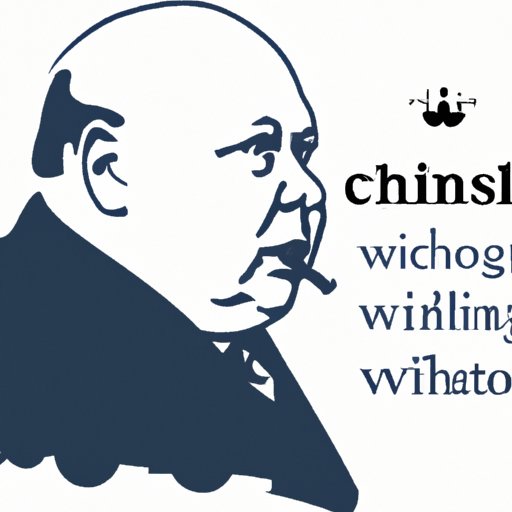Introduction
Sir Winston Churchill is widely considered to be one of the greatest leaders of all time. His leadership during World War II was influential in helping Britain to withstand Nazi Germany’s onslaught, and his legacy lives on today. But what exactly made him such a great leader? This article will explore Churchill’s philosophy, approach to difficult decisions, ability to inspire others, wartime successes, and legacy as a great leader.
Analyzing Churchill’s Leadership Style and Philosophy
Churchill was a masterful leader who possessed a number of important qualities that enabled him to lead effectively. One of these qualities was his visionary thinking. He had the ability to look beyond the present moment and anticipate the future. This allowed him to make decisions that would benefit Britain in the long-term, even if they were unpopular in the short-term. He also had immense courage and determination, which enabled him to stay focused on the goal, despite any obstacles or opposition he faced.
Another key quality of Churchill’s leadership was his ability to delegate. He was not afraid to trust others with important tasks, allowing them to take responsibility for their own actions. This helped him to build a strong team of people who respected and followed his leadership.
Examining Churchill’s Approach to Difficult Decisions
Churchill was known for his willingness to take risks and make tough decisions when needed. He was unafraid of failure and used it as a learning experience to help him make better decisions in the future. He also had the ability to remain calm and rational in pressure situations, enabling him to think clearly and make sound decisions.
Churchill also had a high level of emotional intelligence, which enabled him to understand and empathize with the feelings of those around him. This helped him to connect with people on a deeper level and gain their respect and loyalty.
Exploring Churchill’s Ability to Inspire Others
One of Churchill’s most powerful qualities was his ability to inspire and motivate others. He was a masterful speaker and had a remarkable command of language, which he used to great effect to rally the people of Britain during times of crisis. He also had a unique charisma and pathos that enabled him to captivate and engage his audience.
Churchill was also able to connect with people on a personal level. He was a passionate believer in democracy and social reform and was committed to improving the lives of the citizens of Britain. His passion and dedication inspired those around him to follow his lead.
Discussing Churchill’s Commitment to the Citizens of Britain
Throughout his career, Churchill showed unwavering support for democracy and social reform. He believed strongly in the need for a fairer and more just society, and was dedicated to improving the lives of the people of Britain. He championed the rights of workers, women, and minorities, and fought for equality and freedom for all citizens.
Churchill’s commitment to democracy and social justice has left a lasting legacy, and his name is still synonymous with greatness. He is remembered as an exemplary leader who set a high standard for future generations to aspire to.
Investigating Churchill’s Wartime Successes
During World War II, Churchill was instrumental in strengthening Britain’s armed forces and preparing them for battle. He was also a skilled diplomat, using his charm and wit to negotiate with foreign powers and secure vital allies. His strategic planning was key to Britain’s victory, and his foresight enabled him to anticipate and plan for potential scenarios.
Assessing Churchill’s Legacy as a Great Leader
Churchill’s impact on the world is undeniable. His leadership during World War II changed the course of history, and his legacy as a great leader lives on today. He is remembered for his courage, determination, and unwavering commitment to democracy and social reform. His example of greatness continues to inspire leaders around the world.
Conclusion
Winston Churchill is widely regarded as one of the greatest leaders of all time. His visionary thinking, courage, and determination enabled him to lead Britain through some of its darkest hours. His commitment to democracy and social reform earned him the respect of the people of Britain, and his legacy as an exemplary leader continues to inspire us today.
(Note: Is this article not meeting your expectations? Do you have knowledge or insights to share? Unlock new opportunities and expand your reach by joining our authors team. Click Registration to join us and share your expertise with our readers.)
